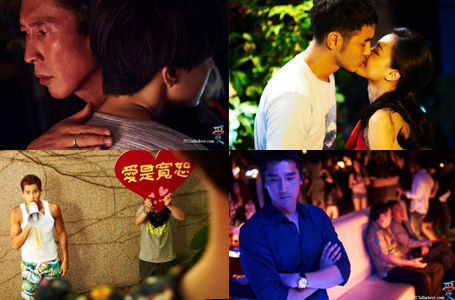
The result, while always good to look at, is also far more scattershot than Niu's previous effort, with the cast matching their roles with varying degrees of success.
The most successful and best of these threads involves Mark Zhao and Vicky Zhao playing two people of Manchu descent (as director Doze Niu is). Zhao plays Mark Na, who wants to buy an old-fashioned courtyard house in Beijing, and Vicky is Jin, the agent who shows him to his prime real estate and breaks her leg in the process. Jin however is also a single mother whose son's father ran off years ago to Taiwan and has never returned, this has resulted in her son Dodo being targeted by bullies at school who mock his orphan status. With the help of a mainland Chinese cop apparently only known by his serial number (an eerie truth in China itself), Mark gradually becomes a surrogate father to Dodo and a possible new husband for Jin. The transformation of Mark feel reals and touching, and his interactions with Jin and the child actor playing Dodo feel real and have a palpable chemistry, while the cultural clashes and the exploration into the subculture of contemporary Manchus in China and Taiwan is intriguing.
Other threads are less successful; an amateur filmmaker Kai is torn between a cycling captain, Li Yijia, and his former girlfriend Xiaoni, who is the daughter of prominent magnate Mr Lu (Doze Niu himself). Li Yijia's brother is the socially awkward Kuan (Ethan Ruan), and their parents run a restaurant and one day, he saves Mr Lu's trophy fiancee, Joy (Shu Qi), from a 'stalker' from which they fall in love. These threads are in general less successful as Doze Niu tends to overload the proceedings with fluff and whimsy to the extent that the moments of seriousness or emotional gravity fail to ring true, or much less so than in the Mark/Jin thread. Shu Qi manages to buoy her flat character with enough charisma and convey enough depth to defy the standard stereotype of a temptress/trophy wife stereotype.
The most serious flaw though seems to be a lack of unifying themes between the threads, Niu does not depart from tired tropes about love being told in actions rather than words, being giving rather than taking, and the way he expresses such themes between characters lacks tension, with flat buildups coming to life only in brief spurts of catharsis. This pan-Chinese romp doesn't approach what Love Actually is, even if it tries.












 列印版本
列印版本












讀者回應
搶先發表第一個回應吧!
請先登入再使用此功能。